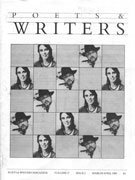Award-winning fiction writer and memorist Tobias Wolff wrote this essay about his friendship with the American poet and short story writer Raymond Carver shortly after Carver's death on August 2, 1988, from lung cancer at the age of fifty. Just weeks before he died, Carver married his long-time partner, the author Tess Gallagher. The Library of America released Raymond Carver: Collected Stories in August 2009.
I can’t do justice to my friend Raymond Carver by pulling a long face and speaking in pained, lugubrious tones. It doesn’t work. Ray can’t be remembered that way. What happens instead is that whenever I start to talk about Ray with another of his friends, after a few moments of ritual gravity we begin to remember him as he was, smart and funny and kind, boyish, loyal, tough, peasant-shrewd, fragile. We can’t talk about Ray without telling stories, recalling things he said and did, not a few of them in the realm of outlawry, and then, almost in spite of ourselves, a strange joy, even hilarity, comes over us. And that is as it should be, because Ray made us feel this joy when he was alive and we most truly remember him when we let his memory bring it back to us.
Ray had a great capacity for joy, such as we feel when we have been brought to the brink of death and then miraculously spared. He used to love telling the story about Dostoevsky’s last-minute reprieve, and I always had the sense he was talking about himself, too. He took nothing for granted. Every new day, every moment with his friends, every new story and poem was an astonishment to him. The good and loving life he shared with Tess Gallagher, the extraordinary respect his work inspired in all kinds of people—to Ray, these were miracles. At moments of particular happiness he would look around with pure wonder. “Things could be worse,” he’d say.
He was entirely without pretense. Jim Heynen once told Ray a story about something strange that had happened to him. As Jim was coming out of a bank a bald eagle dropped a salmon bang on the hood of his car, which salmon Jim took home and ate. Not long after Jim told Ray this story he read a poem of Ray’s in which an eagle drops a salmon at the poet’s feet while he’s out taking a walk. Later Jim asked Ray about it, asked if by chance Ray had made use of his story. “Well, Jim,” he said, “I guess I must have, because I don’t take walks.”
Ray had this bedrock honesty about himself, with the effect that you could be equally honest without fear of being judged. He took you as you were, with as little sanctity or heroism as you owned, so long as you did not pretend to more than you owned. There was absolute freedom in his company. One could, and did, reveal anything—Ray had an insatiable, uproarious appetite for stories on the human scale, stories about the endless, losing war our good intentions wage against our circumstance and our nature. He was so greedy for these stories that one day I found myself confessing to something I hadn’t done, just for the pleasure of seeing him shake his head and say, “It’s a jungle out there, Toby, it’s a jungle out there.”
Chekhov wrote of his character Vassilyev that “he had a talent for humanity.” Ray had that talent. Whatever was human interested him, most of all our struggle to survive without becoming less than human. This struggle shaped his life. His understanding of it, compassionate and profound, made him the great writer that he was, and the great friend.
It’s all there in his poem “The Baker.”
Then Pancho Villa came to town
hanged the mayor
and summoned the old and infirm
Count Vronsky to supper.
Pancho introduced his new girl friend,
along with her husband in his white apron,
then asked the Count to tell him
about his unhappy exile in Mexico.
Later, the talk was of women and horses.
Both were experts.
The girl friend giggled
and fussed with the pearl buttons
on Pancho’s shirt until,
promptly at midnight, Pancho went to sleep
with his head on the table.
The husband crossed himself
and left the house holding his boots
without so much as a sign
to his wife or Vronsky.
That anonymous husband, barefooted,
humiliated, trying to save his life, he
is the hero of this poem.
Tobias Wolff’s books include the memoirs This Boy’s Life and In Pharaoh’s Army: Memories of the Lost War; the short novel The Barracks Thief; the novel Old School, and four collections of short stories, In the Garden of the North American Martyrs, Back in the World, The Night in Question, and, most recently, Our Story Begins: New and Selected Stories. He has also edited several anthologies, among them Best American Short Stories 1994, A Doctor’s Visit: The Short Stories of Anton Chekhov, and The Vintage Book of Contemporary American Short Stories. His work is translated widely and has received numerous awards, including the PEN/Faulkner Award, the Los Angeles Times Book Prize, both the PEN/Malamud and the Rea Award for Excellence in the Short Story, the Story Prize, and the Academy Award in Literature from the American Academy of Arts and Letters. He is the Ward W. and Priscilla B. Woods Professor of English at Stanford.








